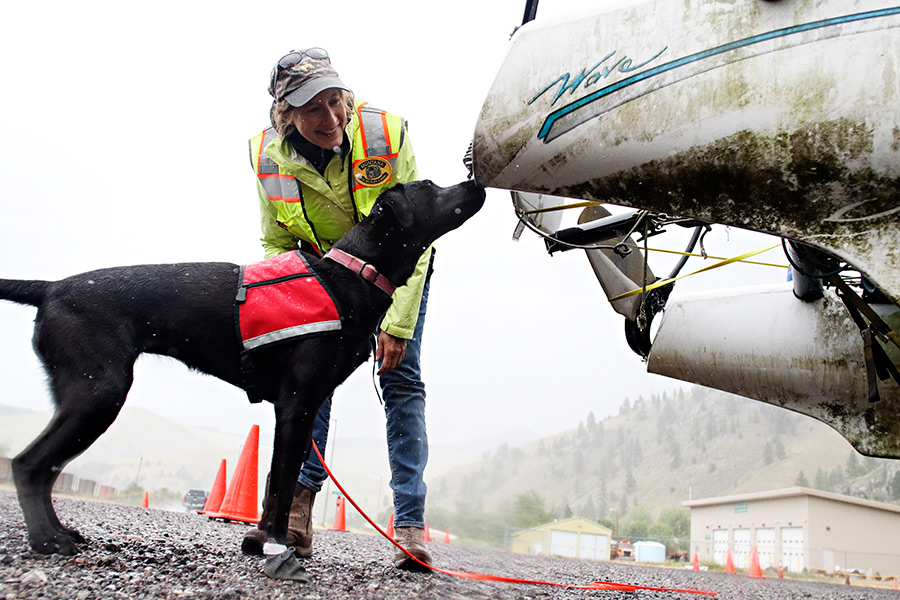Parting Waters
An acrimonious relationship between the leader of a water-quality group and its administrative umbrella has drawn to a bitter close
By Tristan Scott
An escalating dispute between the leader of a local water-quality group and the state agency administratively attached to it reached new heights last week when the group’s executive director was fired for being “dishonest, subversive and disruptive” to the agency’s operations.
But Caryn Miske, former head of the Flathead Basin Commission, denies that any of her actions ran afoul of her duties, and argues in a grievance filed against the Montana Department of Natural Resources and Conservation that the intent of the legislatively established commission is to operate independently of state government in order to hold it accountable. Miske contends the DNRC’s top brass retaliated against her for political reasons and due to personality conflicts and a power struggle, first targeting the commission by dramatically slashing its budget and then dismissing its lone salaried staff member.
A lengthy Feb. 26 termination letter authored by DNRC Division Administrator Mark Bostrom portrays sharp differences in how the agency interprets the independence of the Flathead Basin Commission.
“The FBC was never intended by the Legislature to deliver agency oversight. Your role in promoting the ‘agency watchdog’ concept, rather than grounding the FBC in its statutory duties, is dishonest, subversive, and disruptive of state agency operations and adds to the weight of evidence that you are ill-suited to continue as the FBC’s Executive Director,” the letter states. “This action is based on your chronic and pervasive failure.”
Among the allegations that led to Miske’s firing are that she led an unauthorized attempt to change the structure of government; circumvented the executive planning process; misled FBC commissioners to operate outside of statutory bounds; and repeatedly mismanaged financial and administrative functions.
The termination letter accuses Miske of using state resources to solicit donations to the Flathead Community Foundation, a nonprofit designed to pay FBC costs and bolster the pool of resources the commission had to fulfill its mission. Indeed, through fundraising, grants and partnerships, Miske said the commission more than quadrupled its budget every year.
Advocates of the basin commission defend its former leader, pointing to a long-running clash between Miske and DNRC Director John Tubbs, with whom she frequently butted heads and regularly criticized.
“He developed a very hostile relationship to Caryn,” Chas Cartwright, a former FBC chair and the former superintendent of Glacier National Park, said. “Bureaucratic paperwork was not her strong suit. She doesn’t always get it done on time. But find me a bigger workhorse than her. She made things happen that benefited the entire region.”
Tubbs acknowledges that Miske and DNRC officials have often found themselves at odds, but denies wholesale that defunding the Flathead Basin Commission and dismissing Miske has anything to do with retribution. Rather, it was in response to Montana’s budget shortfall that required across-the-board cuts, and for Miske’s habit of shirking her responsibilities as a government employee — a point she disputes as the head of an independent commission.
“For my entire tenure, I have been concerned with what the executive director’s relationship has been with the state,” Tubbs told the Beacon last November, when state agencies were faced with steep budget cuts and the Basin Commission’s $150,000 budget landed on the chopping block. “She has not hidden the fact that she believes the state agencies are not good actors. But the bottom line is that I personally have a very large hole to fill in a state agency’s budget. That is not a vendetta.”
Anne Sherwood, the attorney representing Miske through the grievance process, said her client’s administrative duties may have come up short at times due to an outsized workload for a commission run by a single full-time employee. However, it did not rise to a level that merits termination.
“Even if the [DNRC] could terminate Ms. Miske’s employment, it lacks good cause to do so under the Montana Wrongful Discharge from Employment Act,” Sherwood wrote in a letter to the DNRC’s human resources manager.

Established by the Montana Legislature in 1983 as an independent body, the Flathead Basin Commission has worked to furnish protections on the region’s prized local waters for 35 years, and is administratively attached to the DNRC, the agency Miske and others say it is also charged with holding accountable.
Initially created to stave off mining and drilling efforts along the Canadian Flathead River north of Glacier National Park, the Flathead Basin Commission has since tackled a range of issues, including providing additional layers of defense to statewide prevention efforts aimed at keeping aquatic invasive species like mussels out of the state’s water bodies.
On that front, Miske has been a vocal critic of the response from the DNRC and Montana Fish, Wildlife and Parks to the positive detection in 2016 of invasive mussel larvae east of the Continental Divide in Tiber Reservoir, as well as their suspected presence in Canyon Ferry Reservoir and the Missouri River near Townsend.
Both locally and statewide, efforts to reduce the risk of devastating aquatic invasive species (AIS) spreading through Montana’s water bodies have since ramped up in response to the detection, including an exponential increase in legislative appropriations to fund the response.
Still, with the threat of invasive mussels knocking on the door of the Flathead Basin, Miske’s fierce independent streak emerged in critiques of the state’s response, as well as through efforts to fund additional AIS inspection stations to make up for what she called shortcomings in the state’s program.
The Flathead Basin Commission’s efforts to curb the threat of invasive mussels entering Montana have included funding watercraft inspection stations on the Blackfeet Indian Reservation, which proved effective, as well as purchasing and training mussel-sniffing canines.
That’s precisely the role of the commission, says Jim Jensen, executive director of the Montana Environmental Information Center, who was a state representative from Billings in 1983 when he co-sponsored the bill establishing the Flathead Basin Commission (FBC).
“It was created as an independent agency expressly to prevent this kind of interference,” Jensen said. “I worked hard on that bill to create the commission with the intent of having an independent body to hold the state government accountable, and Caryn has done an exemplary job.”

“This is a classic bureaucratic power play, with the DNRC doing whatever it can to get rid of a critic who has held them accountable for their failures regarding aquatic invasive species protection in the basin,” Jensen continued.
It’s a sentiment shared by many past FBC members who for years have volunteered their time on the commission and were instrumental in the fight against AIS locally.
In a letter from members of the FBC Executive Committee and signed by former FBC Chair Jan Metzmaker, Vice Chair Rich Janssen, former Chair Thompson Smith, and Jack Potter, a governor-appointed citizen member who worked in Glacier National Park for 40 years before retiring as chief of science and resources, the members accuse DNRC of overreach and undermining the role of an independent commission.
“Her hiring, firing and supervision is under the control of the FBC,” the letter states.
Hal Harper, who served as former Montana Gov. Brian Schweitzer’s chief policy adviser and was elected to the state House 13 times, the first time as a Republican in 1972, worked closely with Miske and the Flathead Basin Commission to help broker the Memorandum of Understanding between British Columbia and Montana that removed coal, oil and gas development in the transboundary valley.
He said Miske was extremely effective in communicating with stakeholders from all corners of the issue and credits her and the FBC with sealing the deal.
But he doesn’t believe the DNRC is vindictively seeding a cloud of suspicion over Miske; rather, he said the state had to make cuts in a year of belt-tightening.
“John Tubbs and the DNRC had to make a decision on where to cut, and it’s too bad but someone’s got to make those decisions,” Harper said. “Every part of the state is hurting and this one hurts the Flathead Basin. But I’m not going to blame Tubbs for what he did. I will say Caryn Miske and the Flathead Basin Commission were incredibly helpful in helping us formulate and ratify the Memorandum of Understanding with British Columbia.”
Sherwood, the attorney representing Miske, also states in her letter to the DNRC that agency officials sought information from personal cell phone and email accounts regarding the investigation into Miske, and asked the agency to cease and desist contacting volunteer members of the commission.
Potter, the governor-appointed member of the FBC, said the request for private information was especially frustrating.
“As a volunteer using my own computer, that kind of privacy invasion is subject to some serious legal questions,” he said. “Even after working in the federal government for 40 years I have never gotten anything like that.”